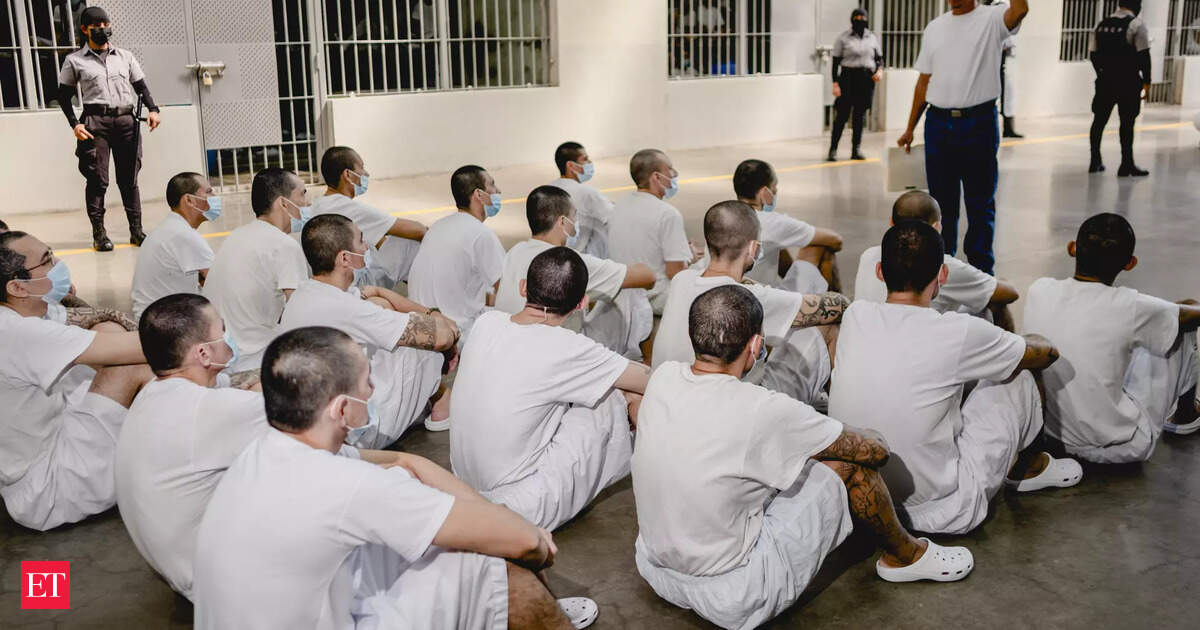The government of South Sudan said in a statement that the men, all of whom had been convicted of crimes in the United States, were “under the care of the relevant authorities,” but said nothing about their whereabouts or their futures. None of their family members have heard from them since they landed just before midnight on July 4, according to their legal team.
Now that the Supreme Court has ruled that the South Sudan deportations pass legal muster, immigration experts say it is likely that the Trump administration will expand the use of so-called “third-country” deportations, an aggressive tactic in which migrants are sent to countries other than their home nations.
Citing the ruling, U.S. Immigration and Customs Enforcement on Wednesday issued new internal guidance that could help accelerate third-country deportations. According to the guidance, when a country has provided “credible diplomatic assurances” that deportees will not be subjected to torture or persecution, deportations can proceed without delay.
When the United States has not received those guarantees, the guidance calls for ICE to inform migrants that they are being sent to a specific country. But it does not require the agency to ask if the migrant fears deportation to that country. The new agency rules appear to allow deportations in as few as six hours, provided the migrant does not raise objections beforehand.
“Because the Supreme Court let them do this, I think they’re now feeling emboldened to do it on a more widespread scale,” said Trina Realmuto, a lawyer representing the migrants sent to South Sudan. The lack of information about the eight men, she added, “creates fear” and puts their family members “in an untenable position.” Realmuto called the new guidance “unlawful,” noting that her team had already pushed back against an earlier version in court. The men sent to South Sudan hailed from six countries; only one came from South Sudan. A New York Times investigation found that administration officials have approached more than 50 countries about accepting deportees from the United States.
As President Donald Trump builds the infrastructure to carry out mass deportations, with domestic military deployments and $165 billion for the Department of Homeland Security, third-country agreements could offer a path to swiftly move large numbers of detainees out of U.S. custody with little due process.
ICE has long reported difficulty in getting countries to accept their own nationals, because of a lack of diplomatic relations, an inability to get travel documents quickly enough, or, in some cases, because the migrants had been convicted of crimes. Migrants from these countries have been detained for long periods of time or released into the United States.
But the approach still faces some obstacles. Federal judges continue to grapple with the question of whether the agreements with third countries mean the United States still has “constructive custody” of migrants deported under those deals, and some ongoing legal responsibility for their treatment.
And the lack of information about detainees sent to South Sudan and El Salvador has drawn charges from a group of independent experts appointed by the United Nations that the United States may be engaging in “enforced disappearance,” state-sponsored abductions that are banned under international law.
In April, the U.N. experts issued a statement that U.S. deportations of Venezuelans to El Salvador “appeared to involve enforced disappearances.” Last Tuesday, days after the Supreme Court ruled that the flight to South Sudan could move forward, the experts broadened their concerns to include the Trump administration’s deportation policies more generally.
Gabriella Citroni, an international law expert who chairs the U.N. group, said U.S. officials had “not been cooperative” in response to their questions, adding that as recently as a year ago, the United States was “very responsive.”
A Department of Homeland Security spokesperson declined to comment.
The United States is not a party to the treaty that makes enforced disappearances a crime, and in some cases a crime against humanity, under international law. The term is often associated with Latin American military dictatorships from the Cold War era that abducted their own citizens. The Biden administration called them “an egregious human rights violation” and criticized authoritarian adversaries like Russia and China for inflicting them on dissidents and ethnic minorities.
In September, the U.N. experts will deliver a formal update on their consideration of the deportations as part of their annual report to the U.N. Human Rights Council, which the Trump administration withdrew from in February. They will present again at the New York meeting of the U.N. General Assembly later in the fall.
The investigation is already having direct consequences in U.S. courts. A report from Citroni’s group was filed as evidence by lawyers representing a group of Venezuelan men in federal court last week. It appeared to show contradictions in how the United States and El Salvador had described the legal status of migrants who were deported to El Salvador and detained in a high-security prison.
In those documents, the government of El Salvador told the U.N. group that detaining deportees from the United States was “within the scope of the justice system and law enforcement” of “that other state,” referring to the United States. That contradicted statements made in court by U.S. officials that the United States did not have “constructive custody” of Venezuelans held in El Salvador, and that they were now beyond U.S. control.
The Trump administration has responded to criticism by U.N. officials in other contexts with indifference and occasional hostility. But if the charges of enforced disappearance gather momentum, that could mean further withering of the postwar image of the United States as a champion of freedom and democracy.
“This is really detrimental to U.S. standing in the international community,” said Natalie Cadwalader-Schultheis, an immigration attorney who alerted U.S. border practices to the U.N. “There will be consequences with other countries who are alarmed over this erosion of human rights.”
Legal experts also fear the Trump administration could seek to expand aggressive deportation measures even more, perhaps to U.S. citizens, as Trump has suggested.
“Homegrowns are next,” he said after an April White House meeting with Nayib Bukele, El Salvador’s president. “You got to build about five more places.”
That scenario isn’t as far-fetched as it might sound, according to a former official who served in the Biden administration. “If we’re grabbing people off the street — which we are — what makes us have any confidence that arbitrary detentions won’t extend further?” asked Ambassador Michèle Taylor, who represented the United States at the U.N. Human Rights Council until earlier this year, and who supported Joe Biden’s 2020 presidential campaign. “Especially from an administration that has indicated they will go after their political enemies. Where does it end?”
The willingness of the Trump administration to send migrants to countries like Libya and South Sudan, critics have noted, represents a reversal of a long-standing U.S. policy against sending migrants to places where they might be at risk of torture or persecution. Known as “non-refoulement,” that principle is woven through U.S. immigration laws governing asylum, as well as the Convention Against Torture, another international treaty, provisions of which the United States ratified in 1994.
The lack of information about the South Sudan deportees is troubling, said John Bolton, who served as Trump’s national security adviser during his first term.
A longtime critic of the U.N., Bolton said domestic politics, not international law, was the right forum to debate the deportations. But, he added: “The purpose of deportations is to remove illegal aliens, particularly aliens who have committed crimes in the U.S. Why harm that effort by making moves that could hurt us politically or legally elsewhere? It’s a self-inflicted wound.”
The administration has emphasized that all the men sent to South Sudan had been convicted of violent crimes, though many had either completed or were nearing the end of their sentences. The men were held in shackles for weeks inside an air-conditioned shipping container at Camp Lemonnier, a U.S. military base in Djibouti. A federal judge in Boston had paused their deportations on due-process grounds, ruling that they could not be sent to South Sudan without first having the opportunity to voice a reasonable fear of torture. The government appealed the judge’s order to the Supreme Court and won.
The administration has told the court that South Sudan has given it diplomatic assurances the men will not face torture. In its statement last week, South Sudan’s government said it would “adhere to the rule of law, international obligations and norms.”
For now, the location of the men is unknown. In an interview with Politico published Friday, Tom Homan, Trump’s border czar, said he did not know if the eight men were still being detained in South Sudan, or where they would ultimately wind up.
“There’s like a hundred different endings to this,” he said. “I do not know.”









